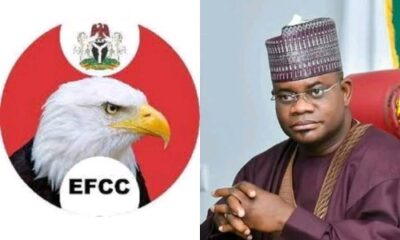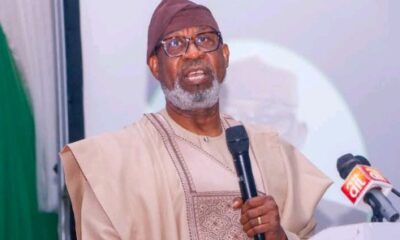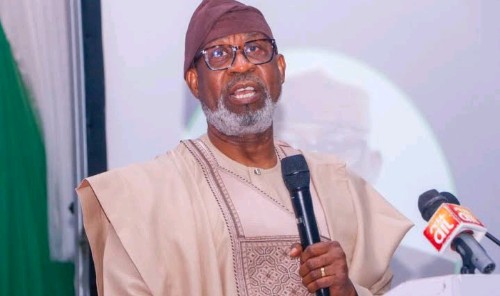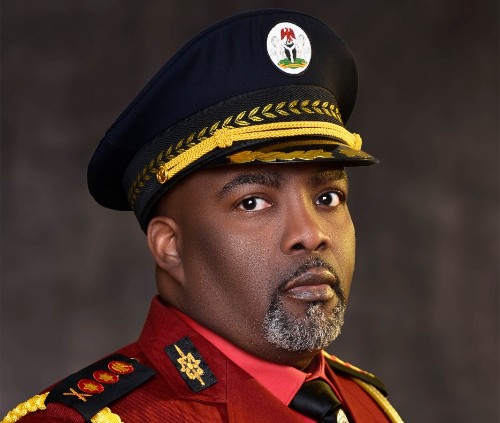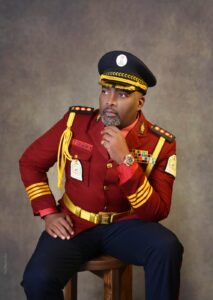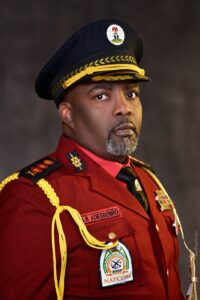The dust is yet to settle, following the efforts of the Economic and Financial Crimes Commission (EFCC) to arrest the immediate past governor of Kogi State, Yahaya Bello last week, on the heels of the anti-graft agency preparation to arraign him over corruption charges. This development is more than what meets the eye, as it’s laden with intricate details that are the kernel of this lucid treatise.
The attempt to arrest the ex-governor led to the gestapo like siege to his residence located in Wuse Zone 4, FCT earlier. Officials of the EFCC cordoned off the road and entrance to the residence of the former Kogi State governor for most of Wednesday.
Despite the heavy presence of EFCC operatives around Bello’s residence, his successor in office, Usman Ododo, paid him a solidarity visit. Ododo arrived the erstwhile helmsman’s residence in the afternoon and was cheered by the loyalists of the former governor who were present to give support to their embattled principal.
Also, while the siege on Bello’s residence was still on, two conflicting court rulings emerged in respect to the attempt to arrest of the former governor by the EFCC. One of the rulings, which came from a Kogi State High Court sitting in Lokoja, restrained the EFCC from arresting, detaining or prosecuting Bello.
Justice I.A Jamil, who gave the order in a ruling last week, stated that infringing on the fundamental human rights of the former Kogi helmsman is null and void except as authorised by the Court.
“By this order, the EFCC is hereby restrained from arresting, detaining and prosecuting the applicant except as authorised by the Court.
“This is a definite order following the earlier interim injunction given,” he averred.
In another twist in the yoyo-like locomotion of multiple judicial pronouncements, however, the EFCC obtained permission from the Federal High Court sitting in Abuja to arrest the ex-Kogi State governor in preparation to his arraignment on Thursday.
Justice Emeka Nwite granted the warrant this afternoon at the instance of the EFCC.
Love or hate Yahaya Bello, the pertinent questions begging for answers in this litigation are:
The EFCC had in March indicted Yahaya Bello, in an alleged diversion of about N100 billion, an offence said to have been committed months before he assumed office as governor in September 2015. If any third party dissects the budgetary appropriation of Kogi State and it’s IGR dispassionately then the numbers do not add up. The former helmsman meet a humongous liabilities and backlog of non-serviced facilities accruing to the Confluence State that had to be serviced. The pervasive prevarication that colossal funds found it’s into his pockets amount to ‘Alice in Wonderland’ tales.
The anti-graft agency had joined Yahaya Bello in the amended suit alongside the Chief of Staff to Kogi State Governor, Alli Bello, and one Daudu Suleiman, who was re-arraigned by the anti-graft agency before Justice James Omotoso of the Federal High Court, Abuja.
The ex-governor was not a defendant in the original suit, and was not in court on the said day.
Justice Omotoso had granted an accelerated hearing in the matter and had also ordered that all forms of objections must be kept in abeyance till the address stage and the charge were read to them.
In the first count, the former governor, and the two suspects were accused of conspiring with each other in September 2015 and converting N80, 246, 470, 089 to their personal use. For contextual and editorial alignment, the goalposts of allegations have witnessed shifting and amendments.
What court Order did the EFCC appeal against as well as the reason behind it?
It is a germane fact in public domain that the EFCC appealed against the Order granted on the 9th of February, 2024 by the High Court of Kogi State, the said order was an order restraining the EFCC from inviting, arresting or detaining the Applicant vide Notice of Appeal filed on 26th February, 2024.
Also, the EFCC further asked for a stay of Execution of the Interim Order at the Court of Appeal on 21st of March, 2024, which request was refused by the Court of Appeal.
However, on the 6th of March, 2024, in defiance of the interim Orders and their own pending appeal against the interim Order, the EFCC proceeded to prefer a 17 Count(s) Charge before Justice Nwite of the Federal High Court against Yahaya Bello.
The EFCC went further to resort to self help when on the 17th of March, 2024, it approached the same Federal High Court, Abuja, via an Ex-parte application and without informing the said court of the interim Order and their pending appeal against the interim order, to obtain an arrest warrant against the same person in respect of whose Order they had appealed to the court of appeal.
Akin to the above, if indeed the EFCC has nothing to conceal, why are they trying to muddle up the issues on account of the main judgement that was also subsequently delivered in the same High Court of Kogi State without recourse to the interim order that they appealed against and requested to be stayed, which request was refused?
The EFCC claims to have extended invitation to Yahaya Bello’s quarter immediately after his tenure elapsed on January 27th 2024. He has challenged the anti-graft agency to produce a copy of this invitation, including the delivery date and the recipient’s name and endorsement. There’s ample confidence on his part that they cannot provide ample evidence to this effect.
This sudden attempt at trying to confuse unsuspecting public with sentimental press statements and mug shot poster emblazoned with wanted message in capital letters. These actions intended to impugn and malign Yahaya Bello would not help them clear the infraction and abuse of the judicial process to give a dog a bag name to hang it. It’s a recurring decimal and standard MO of the anti-graft agency to embark on the route of smear campaign on suspects in a bid to gain an edge in the gallery of public opinion.
Again, by the admission of EFCC to the effect that they were at the Court of Appeal on the matter, and at the same time, approached a Federal High Court without informing the court of the subsisting order and appeal, is an admission of abuse of judicial process, and a fraudulent deceit of the court that has led it to granting conflicting Orders while appeal was pending.
This approach is a grave infraction of due process of law, subsequently, the statement issued by the learned counsel representing EFCC in the said matter amounts to trying to justify the infraction in a media trial which is unethical and not allowed or recognized in the legal profession.
The NJC should seriously investigate this matter as the conduct of the EFCC lawyer is clearly unethical and smirks of “Jankara” and “Boju Boju” practice of circumventing due course of the law.
The EFCC had appealed the order on March 11, 2024 and sought a stay of execution in Appeal No: CA/ABJ/CV/175/2024: Economic and Financial Crimes Commission v. Alhaji Yahaya Bello. The Court of Appeal did not grant the stay of execution, but fixed yesterday for hearing.
The appeal, however, failed to take place as the registrar told journalists that the appeal was not listed among the cases for the day.
The latest development in this jurisprudential tango, the embattled immediate past Governor of Kogi State, Yahaya Bello said he was ready to appear before the Federal High Court in Abuja to answer to the 19-count charge the Economic and Financial Crimes Commission, EFCC, preferred against him.
Though Bello was absent for his arraignment, he briefed a team of lawyers who addressed the court on his behalf on Tuesday. A member of his legal team, Mr. Adeola Adedipe, SAN, told the court that his client would have made himself available for the proceedings, but all he clamours for is the strict adherence to the rule of law.
“The defendant wants to come to court but he is afraid that there is an order of arrest hanging on his head,” Adedipe, SAN, submitted.
Consequently, he urged the court to set aside the exparte order of arrest it earlier issued against the former governor.
Adedipe, SAN, contended that as at the time the order of arrest was made, the charge had not been served on his client as required by the law.
He noted that it was only at the resumed proceedings on Tuesday that the court okayed substituted service of the charge on the defendant, through his lawyer.
“As at the time the warrant was issued, the order for substituted service had not been made. That order was just made this morning.
“A warrant of arrest should not be hanging on his neck when we leave this court,” counsel to the defendant added.
Time will tell where the pendulum will swing, as Yahaya Bello is fighting a battle of his life to untangle himself from the charges filed by the Nigeria’s anti-graft agency earlier that has caught the attention of all and sundry.
In a nutshell, the pontification of prominent Lutheran pastor in Germany, Martin Niemoller rings a bell in this scenario. “First they came for the socialists, and I did not speak out—because I was not a socialist. Then they came for the trade unionists, and I did not speak out -because I was not a trade unionist. Then they came for the Jews, and I did not speak out – because I was not a Jew. Then they came for me – and there was no one left to speak for me.”
Regardless of his exact words, Niemöller’s message remained consistent: he declared that through silence, indifference, and inaction worse things happen. Alas, reverse is the case as in this part of the world an individual is not presumed innocent until proven guilty. The hounds and irate mob are out and baying for blood aided by apparatus of power with a predetermined ploy to have Yahaya Bello’s head on a plate via the guillotine.
Ayoola Ajanaku is a Communications and Advocacy Specialist based in Lagos, Nigeria.

 BIG STORY4 days ago
BIG STORY4 days ago
 ENTERTAINMENT2 days ago
ENTERTAINMENT2 days ago
 BIG STORY5 days ago
BIG STORY5 days ago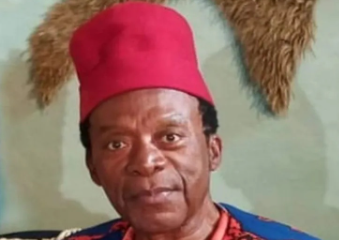
 BIG STORY13 hours ago
BIG STORY13 hours ago
 BIG STORY2 days ago
BIG STORY2 days ago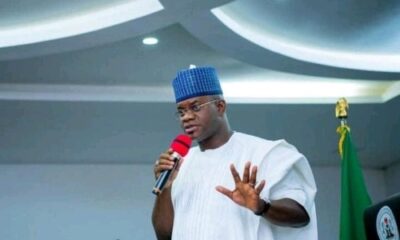
 BIG STORY13 hours ago
BIG STORY13 hours ago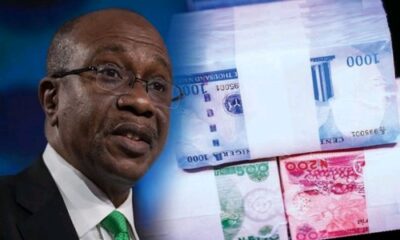
 BIG STORY1 day ago
BIG STORY1 day ago
 BIG STORY2 days ago
BIG STORY2 days ago






